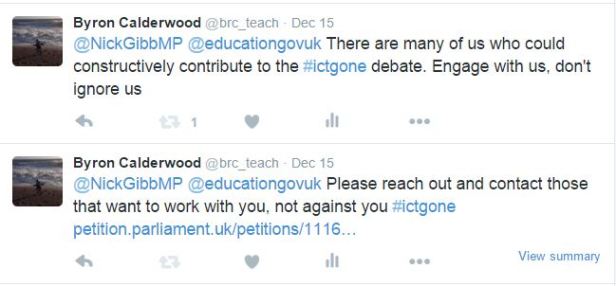The petition to save ICT has now passed 10,000 signatures. This is a significant achievement, but the next stage is to think about the subject content for reformed IT and how it must not be the “same-old, same-old” approach.

Although the DfE are obliged to formally respond to the petition, I have no reason to believe they will change from their current position (i.e. changing to meet demands of 21st Century, more rigorous, companies such as Microsoft and Google had input etc.) and a change of heart by Nick Gibb doesn’t appear to be on the cards.
As time has gone by, I have become certain that they only way the DfE can ensure the continued rise of Computer Science is to downgrade its main competitor, ICT, to a vocational subject.
In a previous blog I argued that the numbers taking Computer Science and ICT were both increasing and demonstrated they could easily co-exist. The subjects serve different audiences but would complement each other. Other examples include Economics and Business, Mathematics and Statistics, Music and Music Technology; History and Ancient History. If it can work for those subjects, why not ICT and Computer Science?
There is a lot of strong feeling about the loss of ICT and the consequences it will have on pupils, especially at GCSE and in particular the number of girls taking the subject. There is concern that Computer Science may not be accessible to pupils of all abilities, which is strange because the need for and importance of digital skills is one area that everyone seems to agrees on.
If there have been positives to take from #ictgone, it is that ICT supporters have finally found their voice and, through social media, a way of getting heard. There has been positive coverage with an increasing recognition that the loss of ICT at GCSE and A level would have on the digital literacy of pupils. Perhaps it took the educational equivalent of looking over the precipice to balance the argument.
All of these thoughts led me to send the following tweets once the petition had reached 10,000 signatures:

It is the season of goodwill after all (even to those whose views we may not agree with) and it was in that spirit that I sent the tweets. I am convinced there are a number of us who, given the opportunity, could contribute to the debate in a constructive and helpful manner. The exam boards may have given up but it appears that we, as teachers, need to carry on the fight.
There may, however, be a way of influencing the debate by contributing to the Science and Technology Select Committee inquiry into the digital skills gap. Written submissions must be sent by Thursday 31 December 2015, including on the following issues:
- The extent to which there is a digital skills gap and whether the Government’s initiatives are appropriate and sufficient to fill the gap;
- Further measures by Government needed to improve digital literacy;
- How well the current education system addresses the digital skills gap;
- What is being done to equip teachers in the classroom;
- The adequacy of the current ICT provision in schools;
- The work being done by universities and industry to ensure that the computing curriculum is relevant;
- The extent to which there is a digital divide and whether digital exclusion exits in the current workforce;
- The financial impact of the lack of basic digital skills on the economy; and
- The extent of any unconscious bias in the digital/IT sector.
This is our chance to state our case for reforming ICT as an academic subject in respect of the digital divide and digital exclusion, but that’s not enough on its own. We need to put forward alternative subject content.
What could ‘reformed IT’ look like?
There needs to be fundamental and far-reaching reform. I would aim for a more accessible course that takes Computer Science as a starting point, but weaves in appropriate IT content. The status quo cannot continue and a “same-old, same-old” approach is doomed to fail.
I would begin with these principles:
- We accept there is some common ground in Computer Science and IT subject content; they are not mutually exclusive
- IT needs to include scientific and mathematical content, as well as higher level thinking, to ensure sufficient rigour
- References to word processing, presentation and desktop publishing software should be removed as much as possible
- Practical areas should be limited to spreadsheets, databases, HTML (using a text editor and browser, not web authoring software)
- Additional practical content could include Javascript and/or Flash animation
- Consider the adoption of a 100% examined approach. This could be through computer-based exams, or a pre-released case study that could be assessed by a written exam
- Be open to renaming the subject (e.g. Computer Studies)
This is by no means a manifesto but if IT is going to survive in some guise as an academic qualification, this may be a way forward. Please feel feel to comment on what I’ve written – we need to urgently put forward ideas before it’s too late.
BRC
